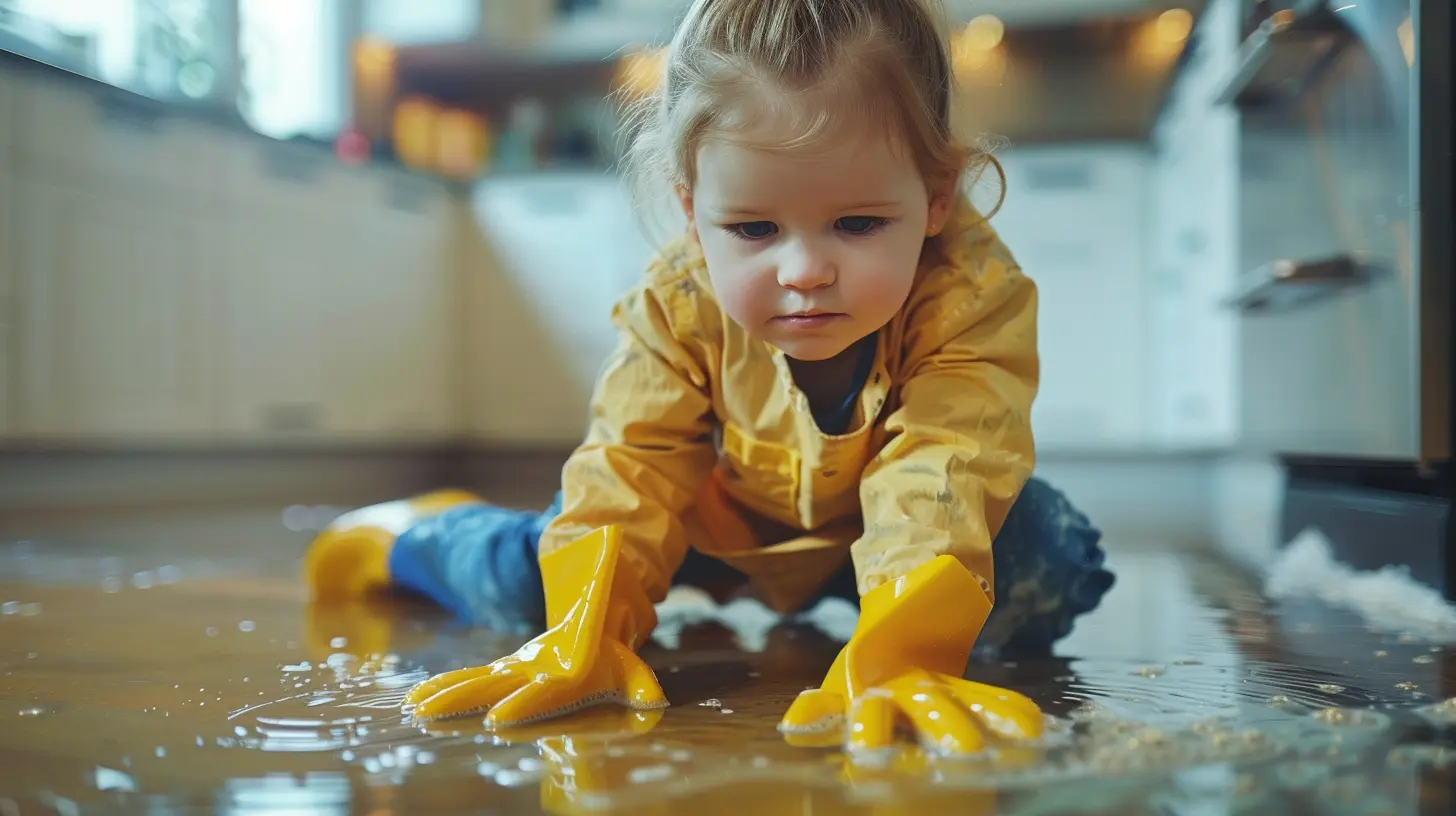The Role of Chores in Teaching Kids to Appreciate Hard Work
25 June 2025
Let’s be honest — convincing kids to do chores can feel like pulling teeth, right? But here’s the thing: those little tasks like making the bed or taking out the trash? They're not just about keeping the house from looking like a tornado hit it. Nope, they’re actually powerful life lessons in disguise. The role of chores in teaching kids to appreciate hard work is bigger than we often give it credit for.
So, if you’ve ever thought, “Is it really worth the headache to get my child to fold their own laundry?”, stick with me. We're about to dive into how chores help shape responsible, hardworking, and grounded young adults. And hey, we’ll throw in some tips to make chore-assigning less of a war zone.
Why Chores Aren’t Just “Busy Work”
When parents assign chores, it’s easy to focus on the immediate — the clean kitchen or the empty dishwasher. But the real magic is what’s going on behind the scenes in your kid's brain. See, chores serve as hands-on lessons in responsibility, effort, and follow-through.Think of them as mini "life reps" — the same way you'd lift weights to build muscle, chores help build character.
Chores Teach Cause and Effect
When kids water the plants and see them thrive, or forget and see them wilt, that’s real-life feedback. It's not just Mom or Dad nagging — it's nature giving them a report card. That connection between action and outcome? Priceless.Building a Work Ethic Starts at Home
Work ethic doesn’t suddenly appear when your child turns 18 and gets their first job. It’s built one dish, one trash bag, one vacuumed carpet at a time. By setting the expectation that everyone contributes, you’re laying the groundwork for habits of diligence and pride in a job well done.
The Long-Term Payoff of Doing Chores
Let’s zoom out for a second. Fast forward ten years — your child is now applying for their first job or living on their own. The habits they’ve formed around responsibility will either be their safety net or their sinking ship.Independence and Self-Sufficiency
No parent wants their kid to be calling at age 25 asking how to use a washing machine. (We’ve all heard those stories, right?) Chores introduce basic life skills early on so that adulting doesn’t hit like a freight train later.Appreciation for Effort
When your kids spend Saturday morning scrubbing bathrooms, they start to realize — hey, this is hard work. Suddenly, they might notice and appreciate the effort you (and others) put in day after day.It’s not about guilt-tripping them. It’s about gently opening their eyes to the idea that clean clothes and hot meals don’t just magically happen.
Teamwork and Empathy
When everyone in the house has a role, kids learn that they’re part of a team. They begin to understand that pulling their weight isn’t just for their benefit — it helps the whole family function better.And that tiny seed of empathy and shared responsibility? That’ll serve them well in friendships, schools, and eventually in workplaces.
Age-Appropriate Chores: Where to Start?
So now you’re thinking, “Okay, I’m on board, but what chores are right for my 4-year-old?” Great question.The key is to match the task with your child’s ability, and don’t underestimate how early they can start.
Toddlers (Ages 2–4)
At this age, it’s all about involving them in simple, safe tasks — mostly for the routine and skill-building rather than the actual help.- Putting toys away
- Tossing dirty clothes in the hamper
- Helping feed pets
- Dusting low surfaces with a cloth
Ages 5–7
Kids can start taking on more responsibility that actually helps you out.- Making their bed
- Helping set the table
- Watering plants
- Putting away groceries
Ages 8–10
Now they’re ready to handle things a bit more independently.- Taking out the trash
- Vacuuming and sweeping
- Folding and putting away laundry
- Preparing simple meals
Tweens and Teens (Ages 11+)
At this point, they should be able to manage full tasks from start to finish.- Doing laundry
- Mowing the lawn
- Babysitting younger siblings (for short periods)
- Cleaning the bathroom and kitchen
Pro tip: Rotate chores so no one gets stuck doing the same dreaded task forever. It keeps things fair and helps them learn a wider range of skills.
Tips to Make Chores Less of a Battle
We all know assigning chores isn’t always smooth sailing. Here are a few ways to avoid the eye-rolls and get those little hands moving:1. Make It Routine
Structure is everything. When kids know that Friday is "laundry day" or that they always take the trash out after dinner, it becomes habit — not a negotiation.2. Use Charts or Apps
Visual chore charts or kid-friendly task apps can work wonders. They offer a satisfying way to track progress (and you don’t have to nag constantly).3. Offer Praise, Not Just Rewards
Yes, allowance or screen time can be motivating. But don’t forget the power of a simple “Hey, you did a really great job vacuuming today.” Kids crave recognition. Let them know their work matters.4. Model What You Preach
If they see you skipping your own responsibilities, they’ll follow suit. Be the example of hard work you want to see in them.5. Let Go of Perfection
It’s tempting to redo that poorly made bed or rewipe that “cleaned” table. Resist. Helping them improve over time is better than squashing their effort and enthusiasm early on.Should You Pay Kids for Doing Chores?
Ah, the great debate. Allowance or no allowance?Here’s the scoop: paying for chores can teach kids about earning money, budgeting, and saving — all super valuable life lessons. But there’s a catch.
If you tie every chore to a dollar, kids might only work when there’s a reward. Not everything in life comes with a paycheck. Sometimes, we have to pitch in just because it’s the right thing to do.
Best of Both Worlds?
Some parents strike a balance by separating “family chores” (expected contributions) from “extra chores” (optional tasks for money). That way, kids learn about responsibility and rewards all in one go.What Chores Teach That Classrooms Can’t
No shade to schools — they’re essential. But the lessons that come from sweeping a floor or folding laundry? You won’t find them in textbooks.Real-World Accountability
Forget theoretical group projects. At home, if your kid doesn’t take out the trash, it piles up. That’s a real consequence. Chores give kids personal responsibility in a way that’s tangible and immediate.Time Management
Chores + homework + sports = a crash course in time juggling. Learning to balance responsibilities at home teaches kids how to plan, prioritize, and follow through.Delayed Gratification
Sometimes, tasks are boring. Sometimes, they’re no fun. But doing them anyway? That’s called grit. And it’s one of the most underrated life skills out there.Your Kids Won’t Thank You Now (But They Will Later)
Here’s the kicker. Most kids aren’t going to say, “Wow, Mom, thanks for teaching me how to load the dishwasher properly!” (Wouldn’t that be something?)But one day — maybe when they’re standing in their own messy college dorm or trying to balance work and home life — they’ll think back. They’ll remember the lessons. The patience. The discipline.
And they’ll get it.
Final Thoughts
Letting your kids be part of the household through chores isn’t just about getting help around the house (though that part is nice, too). It’s about teaching them to appreciate hard work. To value effort. To understand that being part of a family means pitching in, even when it’s inconvenient.Chores build more than clean counters — they build character. So keep assigning them, keep guiding with love and consistency, and know that every dish scrubbed and sock folded is shaping your child into a stronger, more capable, and more appreciative person.
And hey, if you can turn on some music and make it into a dance party while you clean? Even better.
all images in this post were generated using AI tools
Category:
Teaching GratitudeAuthor:

Max Shaffer
Discussion
rate this article
2 comments
Karina McMurtry
Great insights! Chores truly build valuable skills and work ethic in kids!
October 1, 2025 at 2:43 PM

Max Shaffer
Thank you! I'm glad you found the insights valuable. Chores indeed play a crucial role in skill-building and fostering a strong work ethic in children.
Edward Sawyer
Great insights! I'm intrigued by how chores can shape a child's understanding of responsibility and teamwork.
July 7, 2025 at 3:38 AM

Max Shaffer
Thank you! Chores truly are a powerful tool for teaching responsibility and fostering teamwork in children.


